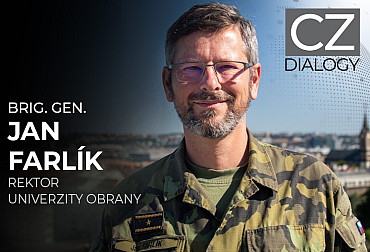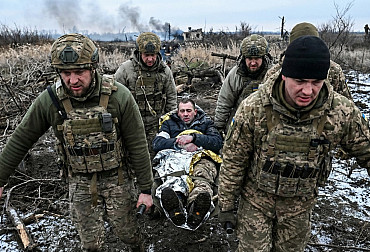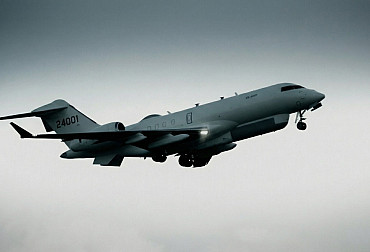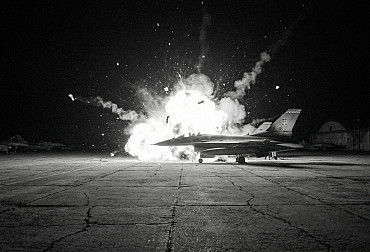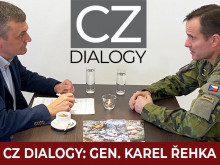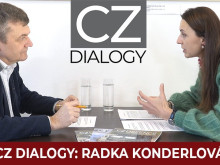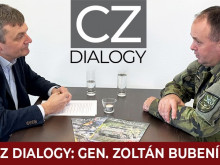Interview with Czech President Petr Pavel on the North Atlantic Alliance and the current security situation
This year the Czech Republic is celebrating the 25th anniversary of its accession to the North Atlantic Treaty Organization, whose enormous importance is clearly visible in the current security situation in Europe. NATO now faces real threats that it must address effectively to ensure maximum protection for its member countries. The Czech Republic has repeatedly declared and confirmed through its actions that it is a firm part of the Alliance and, in the case of assistance to Ukraine, can be said to be setting an example for others. Not only about the current security situation, the North Atlantic Alliance and our membership in it, in our CZ DIALOGUES programme we talked with former Chairman of the NATO Military Committee and current President of the Czech Republic Petr Pavel.
Video: Interview with the President of the Czech Republic Petr Pavel / CZ DEFENCE
Mr President, how do you perceive the current mood in society in the light of the current security situation in Europe and at home?
Unfortunately, not only here, but also in other countries, in the age of advanced digital technologies, assessments based on emotions rather than facts are increasingly common. This is also due to the fact that we are all sources of information today, so that we can all put our wisdom on the Internet. And then the user is usually confused by that, so they don't have the opportunity to be guided much by the arguments, but they are guided by the positive or negative emotion that the information conveys to them. And that applies to the conflicts that we see. That relates to a lot of the internal issues that we deal with. We see that the absence of facts in discussions is striking, for example, in relation to the security situation. I would document this with the example of the war in Ukraine. The Russian aggression on 24 February 2022 caused shock, a sense of threat and a great wave of solidarity. That is to say, it was a very negative emotion on the one hand and a positive emotion on the other, which translated into significant support. Today, we are witnessing rather the opposite trend, with a proliferation of negative opinions that it is not actually in our interests, that Ukrainian refugees are depriving us of our piece of the pie. In this sense, I think it is important when voices are heard in the public debate that present precisely the arguments. If someone is interested, they will, of course, find them. But unfortunately, there are many who are driven purely by emotion.
I suppose you would agree with the Chief of the General Staff, General Rehka, who warns of a possible conflict between Russia and the Alliance.
That the Chief of the General Staff is pointing this out is absolutely correct. After all, it's his job. I think that the Chief of the General Staff, the heads of the intelligence services, the heads of the security services are there to warn us of the risks in the first instance and then to help us manage them. So if the Chief of the General Staff, very rationally and based not only on his analysis but, of course, on the analytical apparatus of the whole army and all our allies, assesses the situation as serious with many risks, then it should be taken as serious and discussed in a factual way. And not to reduce the warnings to the simplistic notion that somebody is a war monger, that he is a warmonger. Because if there is a situation where we completely ignore these warnings and then there is a disaster, we will all be angry why we were not warned. And when someone warns us, we're angry again that they're doing it. I think we have to find a balance where we take a very rational approach to risk assessment. Of course, the military always prepares for the worst, which is absolutely right. If we were preparing for the best-case scenario, then any worse scenario could take us by surprise and catch us off guard.
What can the President of the Republic do for such civic awareness?
The President of the Republic has a rather unique role in that he receives a lot of attention in the media, in the public, and thus any statement he makes has a much greater impact than a statement made by an ordinary citizen. And that is also why the President should take every opportunity to give some rational opinions on issues that move society. In this regard, he can greatly influence public opinion. We have seen this often in the past, unfortunately in a negative sense. Today, on the one hand, the public needs reassurance, reassurance. Where it is appropriate, the President should reassure. Where it is appropriate, on the other hand, to inspire, to encourage - that is what he should do. I try to conduct the debate very rationally and not to raise too many expectations, but also not to frighten. On the contrary, to point out what I am convinced is right and necessary for the vast majority of our citizens in the future.
We are celebrating the twenty-fifth anniversary of the Czech Republic joining the North Atlantic Treaty Organisation. We are aware of our commitment of a modern heavy brigade to NATO structures, but the reality of the times shows that the need to use the capabilities of the Czech Army will be broader. Do you think we are ready for this step and for this provision of support to the Alliance?
On the one hand, we are very fortunate to be a member of the Alliance, because we can share the burden of security and defence with others. But the proverbial Article 5 does not protect us as a universal insurance policy. First of all, it will only work if all allies comply with it 100%, which has not been the case for a long time and which we are not yet complying with. It is not just about whether we spend 2% of GDP on investing in our security, but it is also about how we meet specific substantive requirements. So it is not just about how much we spend, but what we spend it on. Whether it is the quality needed, the quantity needed and, most importantly, whether it is on time. So one thing is meeting our commitments, our share of collective defence, which is expressed in the national force building objectives. And we are meeting about half of those. But then it's also the readiness of the rest of the military and the country. The Army is not just about what it allocates to NATO, but also what tasks it will perform on the ground, how it will contribute to the protection of important targets, how it will perform in support of, say, allied forces moving through our territory. But it is about the whole preparedness of society for some kind of crisis and, in the worst case, for war. It's about preparedness, both mental and professional. Because if any conflict catches us totally unprepared, we will unfortunately face chaos and much more damage than we would have to face if we were to prepare for it continuously.
I will draw on your experience from your previous work. The Czech Republic will be visited by Lord Robertson, who has said in the past that NATO will never be a closed organisation. Although the Alliance is defined by the name 'North Atlantic', it appears that Australia, for example, might be interested in joining the grouping, or there has been talk of South Korea. What do you think about this?
NATO is primarily a regional organisation, and the fact that it was primarily oriented towards European defence was due to the history after the Second World War, when both American and Canadian troops were present in Europe, so it was really more of a European collective defence. And the transatlantic link is there because of the presence of the United States and Canada. But nowadays, as the world becomes more and more globalised, security is also globalised, and from that point of view NATO could not stay on the sidelines and could not kind of isolate itself just to defend Europe. As they used to say in NATO at one time: We have to be focused on Europe, but we have to be aware of the global context because it affects European security. That is also why NATO is concerned with the security situation in, for example, the South China Sea, Africa and the Middle East, because it has a direct impact on Europe's security. As for countries such as Australia, New Zealand, South Korea, Japan or Israel, these are all democratic countries that are in some kind of partnership with the Alliance for various reasons. They are mostly determined by geography, and there this direct alliance, direct entry into NATO, does not make much sense. But the partnership ties are at a high level. Specifically with Australia, for example, it's more or less at the member level in terms of interoperability and the ability to interact, but the contractual commitment is not there. But Australia, for example, now benefits from the recently concluded security agreement with the United Kingdom and the United States (AUKUS), in which it finds a guarantee of its security without having to link it in any way to NATO. I think that for countries that are geographically distant in this way, a smaller security alliance is much more effective than a large one on the other side of the world.
The Alliance has 31 member countries, or will soon have 32 members thanks to Sweden's accession to the Alliance. Does interoperability and decision-making powers or the speed of decisions not suffer as a result?
On the one hand, of course, the more members, the more difficult it is to negotiate consensus. On the other hand, there is a huge amount of legitimacy attached to it. If 32 countries can already agree on something today, and often it is even more, because these negotiations are also taking place with the Alliance partners, and there are about 40 of them, then we are talking about, say, 70 countries that have the same view on how to solve a crisis - that is already evident. This is also evident in the voting in the UN General Assembly. You can see that in the economic aid and the political weight, the diplomatic weight. But on the procedures. It is important that the Alliance has and maintains a culture of unanimous approval on important issues. And here we need to separate the procedural from the substantive, because not everything the Alliance discusses is related to collective defence. Because some countries have such a tendency to carry over the principle of unanimity, and I will simplify it a lot, into how much office paper we buy. On the other hand, there is a healthy tendency to purge the decision-making process of the operational routine and to keep the principle of unanimity really for what concerns collective defence, which is the worst-case scenario in decision-making.
I ask this more because NATO has its political and military wing. For the military one, I have no illusions that there will be a quick agreement, because there are arguments on the table...
Well, neither is...
Still, the link between the military and political aspects, is it like a dance between two worlds?
Well, it is. NATO does have its political and military part, but as it is in any democratic state, the military is subject to political control. That is to say: soldiers are given assignments, they are given instructions and then they carry them out. It is exactly the same in the Alliance. When there is a meeting of, say, a military committee, the military committee has its representatives from each of the member countries, and they receive their instructions from the Ministry of Defence, which relate to technical matters, and from the Ministry of Foreign Affairs and, in many cases, even directly from the President's office, as in the case of France. Many times, in my role as chairman of the military committee, it has happened to me that the French representative was still running away from the table at the last minute to receive a phone call from the President's office with the latest instructions on how to vote on this or that issue. But it is a matter which, on the face of it, looks terribly complicated. Sometimes it takes time before we can agree. But I can tell you, when more than thirty countries agree on something today and conclude it as a common course of action, it really has a lot of power.
However, NATO also includes countries which, at least according to their rhetoric, do not now stand firmly on the principles and values of the Alliance. How do these countries, particularly from the eastern wing, threaten the unity of the Alliance?
There is a nice saying and it is probably attributed to Napoleon. It's hard to have allies, and it's even harder without allies. And this is true everywhere, because getting along with allies is sometimes a nightmare, but being alone is much, much worse. And especially in this day and age, when you have countries on the side of those states that represent aggression, countries that are military superpowers, and of course they have the capability not only in the conventional plane, the nuclear plane, but they have tremendous capability in the information plane and the cyber plane. And in that case, to be alone is to be subjected to disproportionate pressure that an individual country is not able to handle. And that is also why, after 1989, we sought to increase security guarantees by becoming part of European structures. Today, other countries are seeking to do the same. Many wonder why Ukraine in particular should be a member of NATO or the EU, but they are looking for exactly the same level of security and guarantees that we were looking for, because, unfortunately, that is the kind of neighbour they have. And we see that every day.
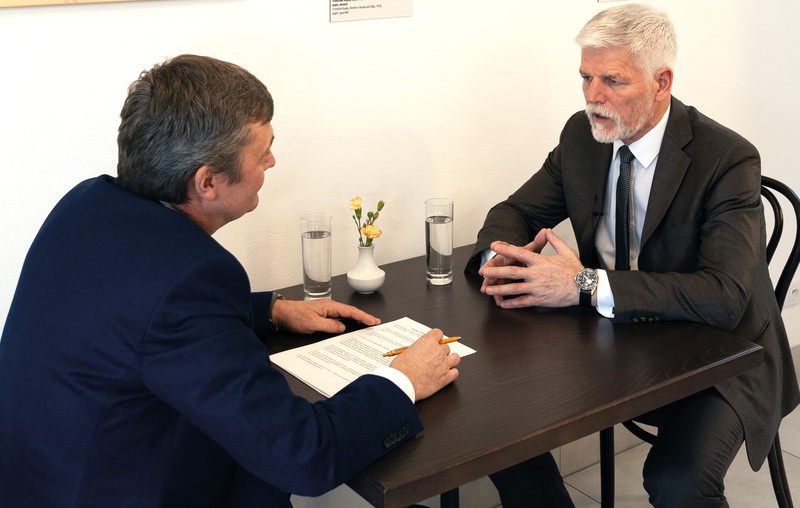
What is your opinion on the unification of the armament of the alliance units through the lens of, for example, F-35 fighters. Also the Leopard tanks look like they will be massively ordered across Europe. Or 155 mm artillery ammunition. What do you think about that?
In principle, of course, unification is one of the most important elements of combat power and the ability to conduct any military activity, but in practice it is an almost unattainable ideal. Just look at the unification of equipment, armaments, means of communication at the national level alone. Look how much trouble we are going to have to make arrangements between the army, the police within the integrated rescue system. And we are just one country. Much more than unification, it is interoperability, the ability to interact, that is, in organisations such as NATO and the EU. And that is where we are mainly trying to achieve the same standards. That means the same calibre and the same protocols, for example, in electronic communications, the same protocols in monitoring intelligence and in transmitting it in real time. It doesn't necessarily have to be the same type of equipment, but that equipment should fire the same ammunition and use the same fuel if possible, and possibly share some service tools. And that's the ideal situation. You mentioned the F-35. Those are hotly debated today by most people who have no idea. But the very fact that some eighteen countries in the Alliance will have these aircraft is an amazing advantage. Because just when you consider the extent to which you can share training, service, the extent to which you can share training experience. When we were one of the few countries that had Gripen, we had a small group of Gripen users. In the case of the F-35, which will have eighteen countries, it will be even much easier. Because those aircraft are interconnected in a huge network with a range of capabilities, but on top of that we will really be able to benefit from the experience of the countries that have bought them before us. So it will be significantly cheaper for us to operate and maintain them than if we had to try and do it all ourselves again.
We have had two years' experience of war in Ukraine. Yet, when one watches the media, one gets the feeling that this is more a problem for the countries of the eastern wing or the countries of central Europe, which have their historical experience of the Soviet Union or Russia, as opposed to, say, Portugal or Spain. Is NATO as an alliance really united in its view of the threat that is here?
On the one hand, it is probably only natural that the Baltic countries would feel much more urgency in relation to Russia than, say, Portugal. On the other hand, of course, again, countries like Portugal, Spain, Italy, for example, will feel a much greater risk from the south, caused by illegal migration and terrorism, than countries in the north. But the way it works in principle is that all states are aware of the risks to the others, and even if we feel them as urgent at first sight, we know within the Alliance that we have to respect the security concerns of the others. So all states, including those in the very west of the Alliance, perceive a sense of threat to, for example, the Baltic countries. And that's why the enhanced forward defence initiative has also been created, to which a large number of NATO countries are contributing. Even those who are not directly affected by the Russian threat. And likewise, the states that are in the north and east of the Alliance are contributing to measures in relation to the global south. I think we know very well in this respect that we have to get along with each other, because it is not possible for us to start dividing on security threats.
You have been to Ukraine and you have seen the Gaza Strip. What did you take away from those visits? Is it possible to find any connecting points between these two major conflicts?
Each of them has a completely different background and a different origin, a different course. What came out of these two visits, at least for me, as such a connecting element is that without knowing the evolution of the conflict and its context, it is really terribly difficult to take a balanced position. And that's why I would also recommend that anybody who is assessing such conflicts should be restrained in their assessments, because it's very easy for them to speak out of turn. The conflict in Ukraine from the point of view of international law is absolutely clear. There is an aggressor who has violated the sovereignty of a country that is recognised by everyone, even the aggressor itself. It had guaranteed security, the inviolability of its borders, and Russia violated this own treaty in 2014. In the case of the conflict in the Middle East, this is a problem that cyclically returns because the root cause has never been satisfactorily resolved. The symptoms are dealt with, such as the Israeli military action in Gaza now, but the root of the problem is not dealt with. If it should end with the military wing of Hamas being defeated, or at least largely defeated in Gaza, that does not mean that Hamas has been defeated at all. Not even that the military part of it has been defeated, because part of Hamas is operating in the West Bank or will move to other countries. But the ideology of the organisation, that will remain, and the bitterness of the Palestinians that their main problem, that is, the absence of statehood, has not been solved in any way, will remain there. And in time it will bubble to the surface again and there will be another Palestinian-Israeli war. So there, too, the problem needs to be addressed. Not just on the surface, but the causes must be addressed.
If we add to these two conflicts the current conflict in Africa, the Iran-Pakistan border, the conflict between China and Taiwan, are we not witnessing the emergence of some great global third world war?
I don't think I would see it quite that dramatic, although many analysts suggest that we could be headed there. But it is true that we are increasingly seeing competition at various levels between democracies on the one hand and various forms of autocracy on the other. And that autocracy can take the form of Chinese, Russian, theocratic, as in Iran, or completely confused, as in North Korea. But then there are a number of countries that are somewhere in between, and they will be inspired by whichever proves more viable. These are countries in Africa and Latin America, for example, which have now lost a bit of a link with the West, don't quite trust Russia and China as "new partners" and are now just waiting to see how it plays out, which side they should pragmatically take. And the competition, the rivalry, is not only in military terms, although not as open warfare, but mostly through hybrid attacks and cyber-actions. It is also taking place on the economic plane, it is taking place on the informational plane, but it is clear that the struggle is there and will certainly manifest itself in various forms. It may happen that in some regions, the military component of the force, say, will be given priority. However, it will really depend on us as citizens of a democratic world how resilient we are, how able and determined we are to defend the way of life that we believe is right, not only internally but also externally. And how we inspire others. If we convince them that it will be better to be our allies than the other side's allies.
The defence industry is an important part of Czech industry. After all, the Czech Republic, or more precisely Czechoslovakia, has always been seen as a strong arms-producing country. How do you assess the current quality of the defence industry in the Czech Republic? And can anything be done to enable our companies to supply more materials to the Czech Army?
This is a topic for a long discussion. Our defence industry has indeed a long tradition. It still has a good reputation in the world and many of the products of our current defence industry are world-class. There is no doubt about that. What is often lacking is greater cooperation with the defence industry on trends, on what the army should or could need. Unfortunately, these concerns are due to a series of cases in the past that have created such an atmosphere of fear to communicate with the defence industry at all, so that it is not perceived as interference in public procurement. And I think that is a rather damaging phenomenon that is hampering us today. On the other hand, debates with industry are becoming the norm and I think in many respects they are absolutely necessary because the defence industry today has a much higher capacity in terms of trend-following, in terms of research and development, than the military has. So in many fields, it is not so much the armies anymore as it is the companies that are setting the future standards with their development. For example, it's Harris, which makes communications equipment, which makes something like eighty, maybe ninety percent of all communications equipment in NATO armies and in civilian use today. And then, logically, a company like that, which has such a huge background and development capacity, is also involved in setting standards, not only in national armies, but perhaps in NATO as a whole. But to come back to the defence industry. What is important is that companies in the defence industry are able to access credit. To do that, part of the taxonomy has to change. And the banks' approach today is changing under the pressure of the war in Ukraine. And the second thing is a clear and thoughtful approach by governments that will give clear contracts to the defence industry and guarantee resources for them, which is what the experience of the war in Ukraine, for example, shows is not happening. Because the banks are still not entirely willing to give loans to the defence industry and the defence industry is not getting clear specific orders as to what it has to deliver and when. And then, of course, there is the fact that in two years of war, we have not been able to increase the production of ammunition in any significant way, we have not been able to increase the production of tanks, armoured vehicles, or any other types of equipment, which is quite a serious problem in relation to the risk we face.
Mr President, you mentioned that you will serve only one term as President of the Republic. What tasks have you set yourself and what can actually be achieved during this period?
Five years seems a long time, but in politics it is basically a short time, and when you realise how much is going on. On the other hand, you can get quite a lot done. And now I don't mean such partial things as how many regions I will visit, how many people I will talk to or how many foreign visits I will make, how many NATO summits or EU meetings. I am thinking now more about what I would see as the fulfillment of the presidency, as the essential thing, and that is to change the atmosphere in society. And that's the task I've given myself. Maybe it's a bit ambitious. If I could contribute at least in part to changing the bad mood that we often suffer from into a slightly more positive view of the world, which on the one hand will give us a little bit of confidence, because we really don't have much reason to distrust ourselves. We have plenty of reasons to be happy because we live in a country that is safe and that is relatively rich. We live in a country that is not unlucky enough to have a lot of phenomena like earthquakes and so on. And yet we complain all the time. If, in the five years I have been in office, we had moved even a little bit in the direction that, for example, the Nordic nations are thinking, I would consider that to be the fulfilment of my ambition. That is to say: we know what we have, we know what we want, and we are going for it and looking for pragmatic ways to achieve it. And in doing so, we still enjoy every day that is worthwhile.
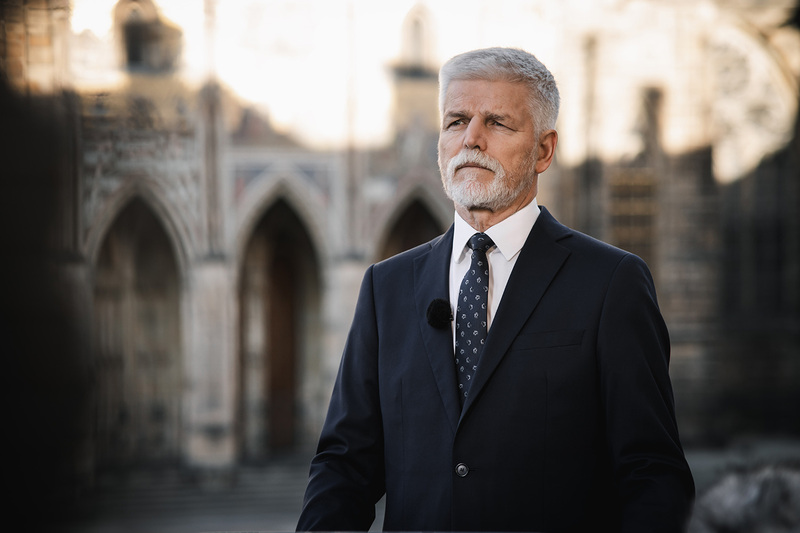
We also talked with President Petr Pavel about meetings with the citizens of Czech cities, how he passes on suggestions from the regions to the relevant ministers, the need for a stable defence spending framework, and how we are or are not prepared for threats and the debate about them. To learn more, listen to the full interview at the top of this article.











